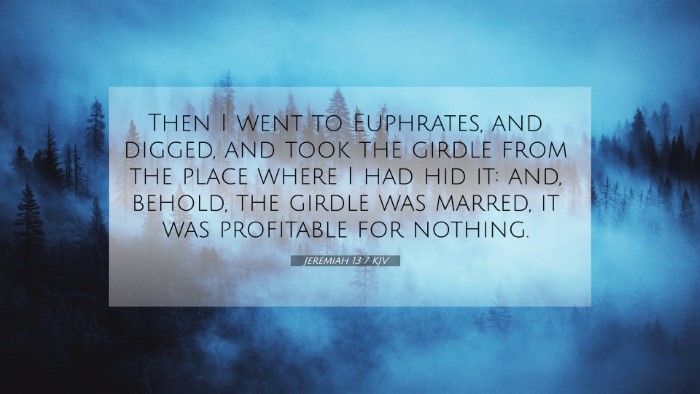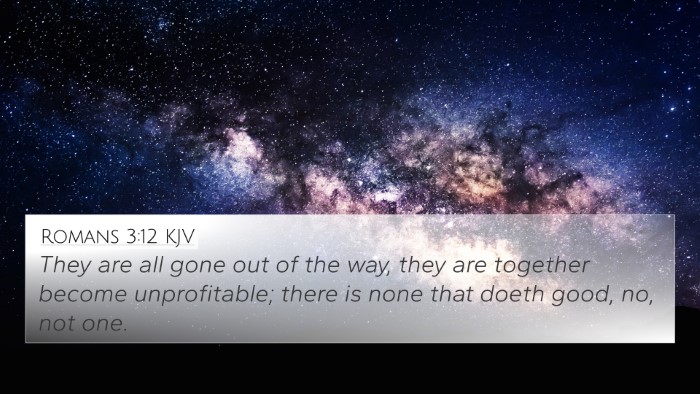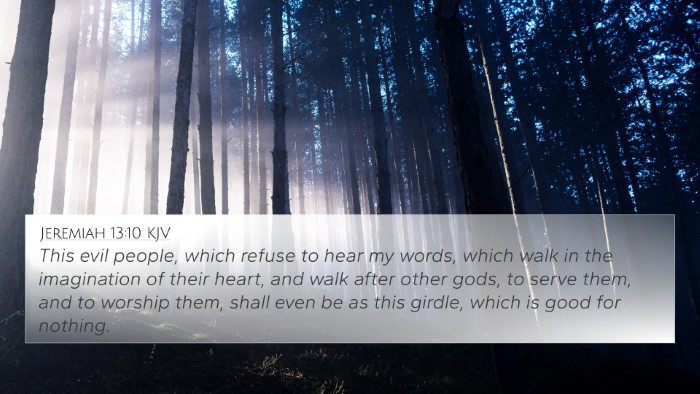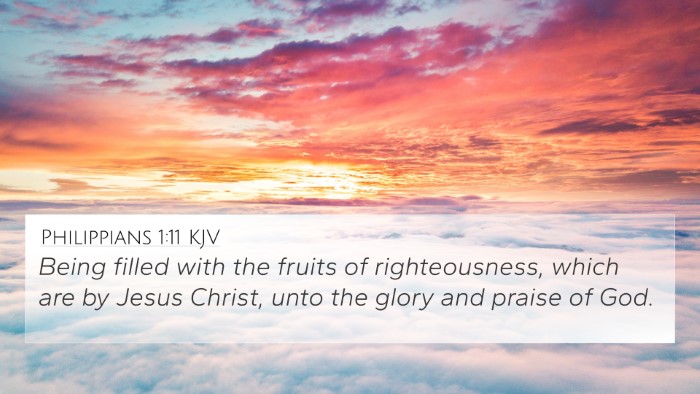Understanding Jeremiah 13:7
Summary of the Verse: Jeremiah 13:7 states, "Then I went to Euphrates, and digged, and took the girdle from the place where I had hid it: and, behold, the girdle was marred, it was profitable for nothing." This verse is part of a symbolic act performed by the prophet Jeremiah to illustrate the state of Judah’s disobedience and ruin.
Commentary Insights
Various public domain commentaries provide deep insights into this verse:
-
Matthew Henry:
Henry emphasizes the symbolism of the girdle as a representation of Israel's pride and the futility of their reliance on themselves rather than on God. The act of hiding and later retrieving the girdle signifies how God will remove His people from His favor due to their iniquities.
-
Albert Barnes:
Barnes highlights that the girdle, intended to symbolize the closeness and attachment of Judah to God, when marred, represents the people's separation from God. The marred girdle serves as a powerful metaphor for the consequences of their sin.
-
Adam Clarke:
According to Clarke, the location by the Euphrates signifies the length to which Jeremiah went to show the futility of their situation. The act also foreshadows the coming destruction of Jerusalem and the carrying away of its people into captivity.
Bible Verse Cross-References
This verse can be cross-referenced with several other significant scriptures to enhance understanding:
- Isaiah 64:6: "But we are all as an unclean thing, and all our righteousnesses are as filthy rags..." - highlighting the unworthiness of human efforts without God.
- Jeremiah 17:9: "The heart is deceitful above all things, and desperately wicked: who can know it?" - emphasizing human corruption.
- Ephesians 2:8-9: "For by grace are ye saved through faith; and that not of yourselves: it is the gift of God..." - connecting grace with the idea of divine reliance.
- Hosea 4:6: "My people are destroyed for lack of knowledge..." - illustrating the consequences of turning from God.
- Romans 12:2: "And be not conformed to this world: but be ye transformed by the renewing of your mind..." - urging transformation and reliance on God.
- Zechariah 11:17: "Woe to the idol shepherd that leaveth the flock!" - a warning against false leadership, reflecting Judah's situation.
- Proverbs 14:12: "There is a way which seemeth right unto a man, but the end thereof are the ways of death." - indicating the folly of human judgment apart from divine wisdom.
Thematic Connections
The message in Jeremiah 13:7 resonates with several themes within the larger Biblical narrative:
- God’s Judgment: This verse signifies divine displeasure against disobedience, as seen in other prophetic writings.
- Symbolism and Metaphor: The use of everyday objects to convey spiritual truths is a common Biblical method, linking this verse to others that use parables or symbolisms.
- Repentance and Restoration: The need for the people to return to God is a recurring theme, paralleling many calls to repentance found throughout Scripture.
Tools for Bible Cross-Referencing
For readers interested in enhancing their understanding of the connections between Bible verses, several tools can be useful:
- Bible Concordance: A reference tool to locate specific words or topics within Scripture.
- Bible Cross-Reference Guide: Resources that provide detailed analysis on related passages.
- Bible Reference Resources: Comprehensive materials that compile thematic links throughout the Bible.
- Cross-Referencing Bible Study Methods: Techniques for studying Scripture through interconnected themes.
Inter-Biblical Dialogue
Understanding Jeremiah 13:7 also invites comparisons and dialogue between different biblical texts:
- Connection with Old Testament Prophets: Similarities exist between Jeremiah's revelations and other prophetic warnings.
- New Testament Perspectives: Exploring how themes of judgment, repentance, and grace carry over into the teachings of Christ and the Apostles.
Final Thoughts
Overall, Jeremiah 13:7 serves not only as a historical account but also as a profound lesson on the nature of human pride and God's call for repentance. By engaging with this verse and its connections through cross-referencing, believers can enrich their understanding of God's Word.










